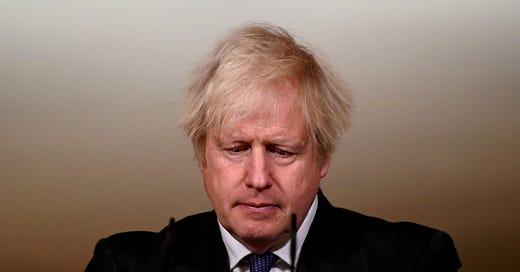
The agent of chaos is at it again. Boris Johnson, frontman of the Brexit disaster show, prime minister responsible for breaking regulations, rules and laws, and overall self-serving gross figure of indulgence, has decided to throw in the towel. He is leaving the House of Commons. The time had come for him to walk to the cricketing Pavilion, accepting the Umpire’s verdict.
Not that Johnson was exactly thrilled with the decision. The findings of the House of Commons Privileges Committee in what is known as the Partygate Report were damning. Released on 15 June 2023, the 30,000-word document details the numerous instances the then Prime Minister systematically undermined the very same pandemic regulations that his own government had implemented, only to then consistently mislead and deceive, most notably the Commons itself. In “deliberately misleading the House Mr Johnson committed a serious contempt. The contempt was all the more serious because it was committed by the Prime Minister, the most senior member of the government.”
The nature of that misleading conduct centred on Johnson’s refusal to double-check advice given to him by, for instance, Jack Doyle, his former press secretary, over a number of gatherings on whether they were compliant with COVID-19 rules and guidance. Johnson’s Principal Private Secretary, Martin Reynolds, had also pressed Johnson on the issue as to whether the guidance “had been followed at all times,” notably on the 18 December 2020 gathering. He wondered “whether it was realistic to argue that all Guidance had been followed at all times, given the nature of the working environment in No. 10. He agreed to delete the reference to Guidance.”
The report had to be rewritten at short notice to take into account Johnson’s abrupt resignation. Had he remained, the Committee members would have recommended a 90-day suspension for, among other things, the former PM’s deliberate misleading of the House, members of the Committee, and being “complicit in the campaign of abuse and attempted intimidation of” its members. Instead, it concluded that Johnson should be deprived of his Member’s pass.
The Committee took umbrage at Johnson’s attack upon its members, which he condemned as undemocratic, a kangaroo court, and executioners of a witch hunt. “We consider,” states the report, “that these statements are completely unacceptable. In our view this conduct, together with the egregious breach of confidentiality, is a serious further contempt.”
His overall contemptuous attitude to the inquiry was also conveyed by his effort “to re-write the meaning of the [pandemic] rules and guidance to fit his own evidence”. One example was the “assertion that ‘imperfect’ social distancing was perfectly acceptable when there were no mitigations in place rather than cancelling a gathering or holding it online, and his assertion that a leaving gathering or a gathering to boost morale was a lawful reason to hold a gathering.”
Johnson’s base of supporters is a shrinking one; but from pandemonium land some continue to express their support. Nigel Adams, MP for Selby and Ainsty, wished to no longer occupy his position in the Commons. Then came former culture secretary Nadine Dorries, who initially claimed she was going to “immediately” step down, only to then do a bit of fence sitting. Bruised in not getting her promised peerage from Johnson, she is seeking answers from the House of Lords appointment committee. She has also warned that any Tory MP who would side with the findings of the report “will be held to account by members of the public. Deselections may follow. It’s serious.”
Brendan Clarke-Smith, MP for Bassetlaw, was similarly “appalled” by the “spiteful, vindictive and overreaching conclusions of the report.” He promised to “be speaking against them both publicly and in the House”. The comically anachronistic Tory Man of the Nineteenth Century, Jacob Rees-Mogg, found himself in agreement, observing that Parliament, when standing “upon its dignity […] often ends up looking foolish. The Privileges Committee report is a case in point.”
Many of the supporters can be said to be part of the scandalous “Honours List” that Johnson drew up on grounds of gratitude, a veritable Who’s Who of fans and flunkeys that was, for the most part, approved by Prime Minister Rishi Sunak. One was the 29-year-old Charlotte Tranter Owen, who has become the youngest life peer in British history. Her less than distinguished journey from York University graduate to a life peer took a mere six unremarkable years.
While some Tories have been desperate to jettison the Johnson link, many were complicit in stacking the compendium of deception. As Peter Oborne explains, the Tory party saw Johnson as an election winner. For three years, they were “thus prepared to put up with his false claims. Ministers and MPs appeared happy to repeat claims on radio and television, in print, and inside the Commons chamber.”
Sunak is, therefore, in more than a spot of bother, not least because Johnson will be holding fort as a newly appointed columnist at the Daily Mail. His plight is made worse given his struggling efforts to keep the party together before potential electoral oblivion. Johnson, with his poison pen tirades, is unlikely to help.
A final note on the whole Boris Bonanza is also worth reiterating. For Oborne, “Johnson will be remembered by history as the most immoral, dishonest and morally squalid of all British premiers.” This is going a bit far; it was a certain Tony Blair who, playing the role of sidekick to US President George W. Bush, embarked upon an illegal war that led to the destruction of Iraq and a good portion of the Middle East. His conduct, both directly or otherwise, in the confection, and intentional misreading of intelligence material elevating Iraq’s Saddam Hussein to the level of globally dangerous despot, must surely be seen as squalid as any. Along the way, he corrupted public life and politicised institutions. And yet he moves and speaks, to this day, with impunity—the one who got away.



